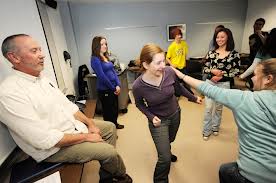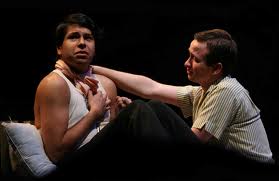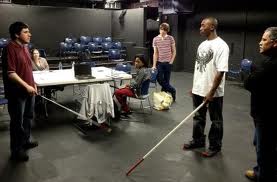

Too often high school and college theatre students want the answers now. In other words, they want to know if they are any good at what they do, when they will finally be accomplished, and what the secrets to success may be. Whether they are actors, writers, designers, directors, or involved in any other type of theatrical endeavor, they often want to in some way be verified as being genuine professionals, or at least having the potential to eventually be one.
But truth be told there’s very little that any theatre teacher, professional, or another theatre artist can do to in some manner validate a theatre student. They must validate themselves. And they must understand and accept that there are three ways to do so.
Hard Work

Perhaps the worst thing any student can have is talent. Too often they believe that a lot of talent and a little work go a long way. The opposite is true. The formula for success is a lot of hard work and some talent makes a professional (eventually).
By hard work, I mean dedication to taking criticism and striving to utilize that criticism towards growth. Those who work hard at anything will do so because they love it, they are passionate about it, and they want to be as good as they can possibly be.
Too many theatre students don’t practice half as much as they should, concentrate very little of specifics and details, and lack goal setting abilities. Emphasize to your theatre students that it is their job, and no one else’s, to create situations where they can get work. They have to constantly be developing new material; auditioning, interviewing; or sending out their work; following up with potential leads; and constantly presenting themselves in a professional manner.
Always Striving to be Better

Professionals always work towards betterment. They know that they are competing against one person: themselves. They have to improve each and everyday. Professionals are never complacent; they welcome challenge and potential failure because they know that’s the only way to grow.
If a student looks at the profession in this manner, then questions revolving around when they will finally be “any good at what they do, when they will finally be accomplished, and what the secrets to success” are become moot.
Be Professional
Being professional comes down to a few key elements. If you are seen as being a professional, then you have a much better chance of being hired by a theatre or producer, and if you act professionally when working for them, you have a good chance of being rehired by them again and again.

What Professionals Do
- Always early
- Always focused
- Considerate of others
- Always meet deadlines
- Always do their best work
- Always want to do better
- Are collaborative
- Always polite
- Know and follow theatre etiquette
- Know and adhere to theatre hierarchy
- Are cooperative
- Communicate effectively
If you display the attributes above, then people will want to work with you. Remember that the theatre is a business with a finite number of hours and dollars to get a job done. If you waste time and money by exhibiting nonprofessional behavior, why would anyone want to hire you again or at all?
Are You a Professional?
If you are a theatre student, whether or not you become a professional is entirely up to you. You may eventually make money in the theatre, but if you lack drive, have an unwillingness to take criticism and improve, and exhibit unprofessional behavior your career will stall. As a student in the theatre (and this also pertains to when you are a professional as all of us in the profession are students to some degree), treat those who are teaching you with respect, understand that you must trust them and be willing to take risks, and know that no one has ever succeed without first being a failure.
Work hard, set high standards for yourself, and treat others as you would like to be treated.

 Random Item
Random Item